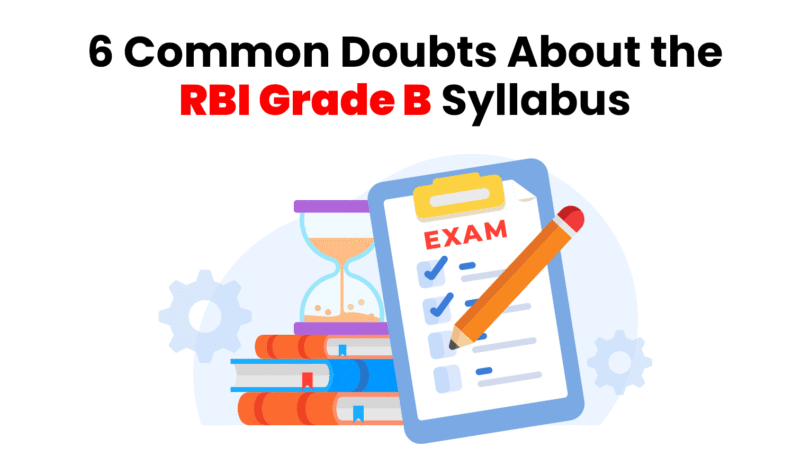In this article we providing information regarding latest 6 Common Doubts About the RBI Grade B Syllabus.
6 Common Doubts About the RBI Grade B Syllabus
The RBI Grade B exam offers a rewarding career that attracts thousands of ambitious graduates every year. However, the journey to becoming an RBI Grade B officer starts with understanding the exam process, where the RBI Grade B syllabus often raises confusion for many candidates. With so many topics and details to cover, candidates often face confusion and have common doubts and misconceptions while preparing for the exam.
In this article, we’ll address 6 such doubts, providing clarity and guidance to help you cover the RBI Grade B syllabus with confidence.

1. Is the RBI Grade B Syllabus Overwhelmingly Vast and Unmanageable?
Many aspirants first feel this way when they see the syllabus they need to study for the RBI Grade B exam. Phase 1 has General Awareness, Reasoning, English, and Quant. Phase 2 includes Economics and Social Issues, Descriptive English, and Finance and Management. Each of these has many topics that further have multiple smaller topics. It can look scary!
The Reality: While the syllabus is undoubtedly comprehensive, it can be handled with a good study plan. The best way is to plan what to study, focus on what’s important and what you’re good at, and study regularly.
- Don’t try to learn everything at once.
- Break it down into smaller, easier parts.
- Try to really understand the ideas instead of just memorizing.
- Going over things again and practicing will help you remember, and the syllabus won’t seem so big after a while.
- Think of it like climbing a mountain – it looks hard at the bottom, but every step you take gets you closer to the top.
2. How Much Emphasis Should I Give to Current Affairs?
Current affairs play a crucial role in the RBI Grade B exam. Current affairs-based questions are asked in the General Awareness section of Phase 1 and the Finance and ESI section of Phase 2. Candidates often wonder about the depth and breadth of current events they need to cover.
The Reality: For Phase 1 General Awareness, focus on the past 3-6 months or current affairs, with a strong emphasis on:
- Recent economic and financial developments
- Government schemes
- RBI circulars and notifications
- National and international news related to banking and finance
For Phase 2 finance and ESI, you need a deeper understanding of current finance, economic, and social issues, their causes, impacts, and potential solutions.
- Stay updated with government policies, reports, and contemporary debates.
- Regularly reading reputable newspapers and following credible online sources is crucial.
Remember, understanding the underlying concepts and their application to current events is more important than simply memorizing facts. It will also help you in writing descriptive answers.
3. Is the Quant and Reasoning Difficulty Level Similar to Other Banking Exams?
Many candidates wonder if the difficulty level of the Quant and Reasoning sections is the same in both general banking exams and the RBI Grade B exam.
The Reality: While the fundamental concepts might overlap with other banking exams, the RBI Grade B exam has a higher difficulty level. The questions asked in the RBI Grade B exam are often more analytical, time-consuming, and require a deeper understanding of the core concepts.
Expect trickier questions that demand strong problem-solving skills and the ability to apply concepts in varied situations.
Therefore, relying solely on your banking exam preparation will not be enough. You really need to practice questions made for the RBI Grade B exam and take practice tests to get used to how they ask things and how difficult they can be.
4. How Important is the English Section in Phase 1?
Some candidates might underestimate the importance of the English section in the RBI Grade B Phase 1 exam and focus more on Quant and Reasoning.
The Reality: Even though the English section does not have as many marks as General Awareness, it’s still really important to clear the sectional cut-off. If you don’t do well enough in English, you might not qualify for Phase 2, even if you do great in the other subjects.
So, it’s important to work on your grammar, vocabulary, understanding what you read, and finding mistakes. Practicing regularly and taking mock tests will help you see what you’re good at and what you need to improve. It will also help you learn how to manage your time during the exam.
5. How Deeply Do I Need to Study ESI and FM?
The RBI Grade B syllabus for ESI and FM in Phase 2 is quite extensive, leading candidates to wonder how much they really need to know.
The Reality: RBI expects you to have a good conceptual understanding of the topics mentioned in the ESI and FM syllabus. While you don’t need to become an expert in every sub-topic, a thorough understanding of the fundamental principles and their application.
Focus on understanding the connections between different economic and social issues and their impact on the Indian economy. For FM, grasp the core concepts of finance and management principles and their relevance to the banking sector.
6. What Kind of Descriptive English Writing Skills are Expected in Phase 2?
The Descriptive English paper in Phase 2 often causes anxiety among students due to its subjective nature. Candidates wonder what kind of essays they’ll have to write, how to write RC answers, and how good their overall writing needs to be.
The Reality: The RBI wants to see if you can clearly write your thoughts in a logical order and with correct grammar. The essay topics are usually about current issues related to the economy, social issues, finance, and banking. A précis tests if you can make a summary of a longer piece of writing. With your RC answers, RBI tests how well you understand the provided paragraph and what inferences you can draw from it.
You should focus on making your writing strong, improving your word choice and grammar, and practicing writing essays on different topics. Writing regularly and getting feedback on your writing will really help you get better at it.
Conclusion
Understanding the RBI Grade B syllabus is key to effective preparation. By addressing these common doubts, you can approach your studies with greater clarity and confidence. Remember, consistent effort, strong conceptual understanding, regular practice, and staying updated are crucial for success in this competitive exam. Stay focus

